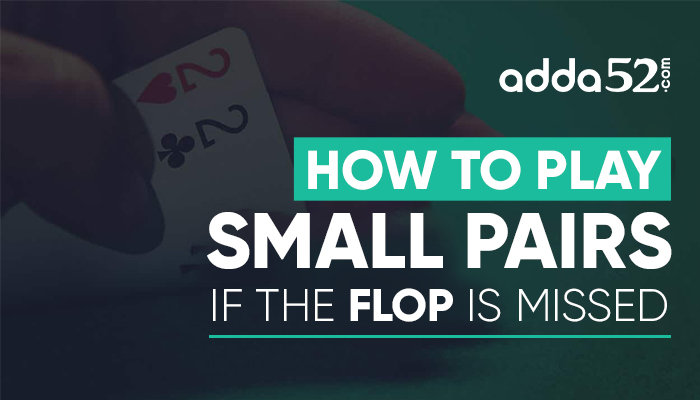There are numerous strategies for every step and the round in online strategy games such as Poker. But the importance of playing in pairs at the Flop round is not known to every poker player. The hand rank when two cards of the same rank irrespective of the suit come up is known as the pair and the round when three community cards are dealt face-up on the board is the flop round. Playing these two things simultaneously is very important and not known to every poker-playing individual. Also, the situation comes when sometimes you miss the flop but still you have to play with pairs. Let us understand through this article, how to proceed in such scenarios.
How to Play Small Pocket Pairs Correctly
Small pocket pairs, particularly at the lower limits in real money games, are often overlooked by newer poker players, even though they can be some of your biggest long-term winners.
By the way, just to be clear, I’m referring to the numbers 22, 33, 44, 55, and 66 in this post. Many beginners underestimate their worth because, on average, they do not improve to a set after the flop (8 out of 9 times). And you’re usually left with three over-cards on the board and no idea where you’re at. As a result, if you want to play these hands passively all of the time, it would be very difficult to make any sort of profit. On the flop, you’ll always find yourself checking or folding.
The easiest method to play small pairs in high card poker is to line mine with them. This implies that you just ought to attempt to hit three of a form along with your small pairs on the flop. If you hit a group then you must play your hand terribly sharply. If you miss the flop although, then your small pair ought to be collapsable.
This is a reasonably easy rationalization although.
So, when taking part in millions and many hands at the micros and running in numerous experiments and tests to assess the profitability of small pairs, this article is here to clear all the doubts.
There would be some spots where you hit the flop as well.
-
On the Flop as the preflop Raiser.
This means that we raise and someone calls us heads up and then we see the flop. In this scenario, we have the range advantage to win the hand. Essentially on the flop, your betting frequency is going to be determined by your position whether you are in-position or out-of-position. Because the position impacts how much of a range advantage you typically have on various boards. For example, when in position, we raise, and the big blind calls it’s a little bit different. If the small blind calls but if big blind calls with a very wide range we raise from pretty much in the position, we are going to have more good hands than they are right because they are defending our big blind very wide. Therefore, on these big uncoordinated boards, we typically have a pretty big range advantage and that’s going to result in us betting very frequently perhaps 80% of the time or more.
As your range advantage decreases you bet a little bit less often. You go from betting everything on your premium hands, your draws, your marginal hands, and your junk to mostly betting premium hands draw plus a few additional hands. Whenever you have a weak range advantage or no range advantage such as on the low cardboards that connect very well with a big blind caller. That’s the time for you to check very frequently.
-
From Out-of-Position
From out-of-position you are never going to have a big range advantage. Because the people who call in position usually have a reasonable range. So, If they have a reasonable range, their range kind of lines up well with yours which can result in you having to check from out-of-position a whole lot more often. Once we decide that we are going to bet we have to figure out how much we are going to bet.
Last Thoughts
For many poker players, small pocket pairs are a source of consternation. They are, though, a very easy pair of hands to master in online poker India.
On rare occasions, you’ll hit a set with them, ensuring that you’ll win the hand over absolutely all your rivals may have. In these conditions, you can gamble heavily on value against the majority of players at lower stakes.
However, you are much more likely to miss your set and be dealt three overcards on the flop with no idea where you stand. If you have a significant betting advantage (which you do), you should actually place a CBet and aim to reduce it as far as possible.
However, whether you were the preflop caller (or if your adversary lifted your CBet on the flop), you could almost always fold your hand.
Small pocket pairs can never be as lucrative as middle or premium pocket pairs, but there’s no excuse why they can’t both be good long-term winners for you if played correctly at lower stakes.


